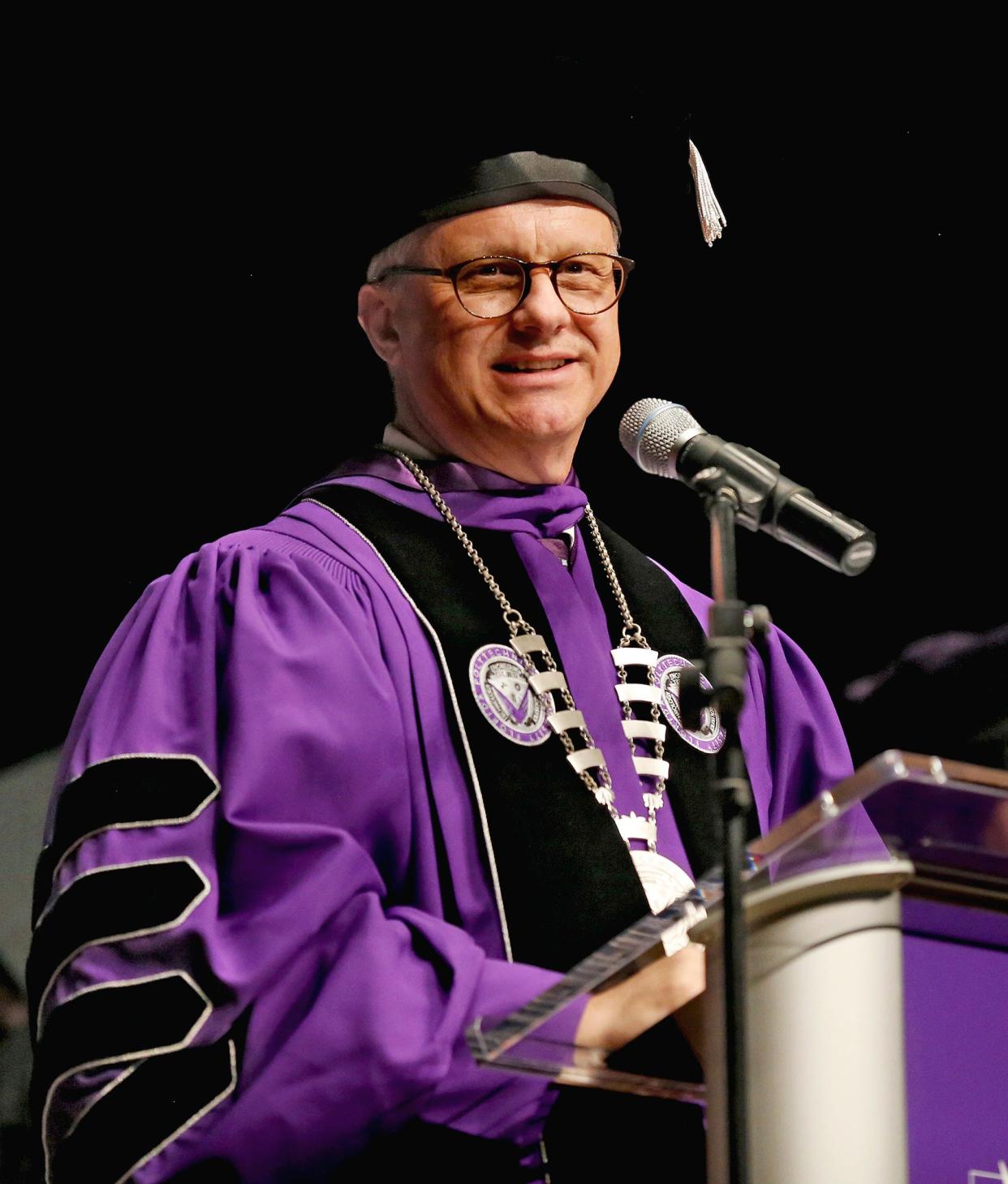Florida Poly president plans to resign next year, move into faculty position

Randy Avent, the only leader Florida Polytechnic University has ever known, intends to resign next summer, though he won’t be leaving campus permanently.
Avent, who has served as president of the Lakeland institution since it opened in 2014, shared his plans in an announcement released Monday morning. He said he plans to rejoin Florida Poly’s faculty following a “brief sabbatical” after leaving his current role.
Florida Poly, the 12th member of Florida’s State University System, originated as a satellite campus of the University of South Florida. Former Florida Sen. J.D. Alexander, a Lake Wales Republican, engineered legislation in 2012 to establish Florida Poly instead as a standalone university, the state’s only one focused entirely on STEM — science, technology, engineering and math.
“Leading the University from its infancy to the strong campus we have today has been the privilege of my lifetime,” Avent wrote in a message to “the Florida Poly family.” “I never imagined that I would be part of establishing a brand-new STEM university and molding the way it would serve students, industry, and the entire state.”
Avent, 64, wrote that he wishes to see a seamless transition and will continue as president “until my successor is solidly in place.” The State University System’s Board of Governors voted in February to give Avent a one-year contract extension through July 6, 2024. He receives an annual salary of about $478,000.
Trustee Gary Wendt donates $2 million to Florida Poly for student leadership programs
Florida Poly is the second-smallest member of the State University System, with about 1,540 students. The university has 73 professors and a staff of 154, according to a fact sheet on its website. The average entering freshman has an SAT score of 1342 and a high school grade-point average of 4.25, the school reports.
The school offers undergraduate degrees in such subjects as applied mathematics, computer science, cybersecurity engineering and data science. It also has graduate programs in four areas.
Avent has presided over the growth of the student population, which numbered just 540 in the school’s first year. Florida Poly opened its second academic building, the Applied Research Center, last year. The school has built two student residences on campus, and a third is now under construction.
Last year, Florida Poly reported an increase of 30% in applications at a time when undergraduate enrollment was declining nationally.
Florida Polytechnic welcomes corporate partner to campus
“Watching Florida Poly rise from its inception to its current standing as a recognized institution of excellence in core STEM education has been nothing short of inspiring,” Avent wrote in his announcement.
He added: “It has been an honor to serve as your founding president and work alongside such dedicated and talented individuals. Our faculty, staff, and students are among the best I have ever worked with. The commitment and passion shown by all has shaped our unique identity.”
Under Avent’s tenure, Florida Poly attained accreditation from the Southern Association of Colleges and Schools Commission on Colleges in 2017. Two years later, the school achieved accreditation from ABET for four of its degree programs.
Florida Poly gained recognition in 2021 as the highest-rated regional institution in the South, according to U.S. News & World Report.
The Tampa Bay Business Journal has named Avent in recent years to its Power 100, a list of the most influential businesspeople in the Tampa Bay area.
Florida Poly did receive some bad news this summer when Florida Gov. Ron DeSantis vetoed $11.2 million from the state budget for a Student Achievement Center. That center would house career and internship services, with study spaces, an auditorium and a collaborative multimedia space, the school said.
The building remains a priority, and Florida Poly leaders will continue to seek state funding for it, spokesperson Lydia Guzman said.
Avent came to Florida Poly from North Carolina State University, where he served as associate vice chancellor of research and a professor of computer science. Before that, he worked as chief scientist in the Defense Department’s Office of Basic Research, according to his official Florida Poly biography.
Florida Polytechnic in Lakeland hires former lawmaker Kelli Stargel as senior advisor
From 1986 to 2006, Avent worked in Massachusetts Institute of Technology’s Lincoln Laboratory, holding several roles, including associate chief technology officer.
Avent has led efforts to promote an “innovation district” around the Florida Poly campus, modeled on the Research Triangle in North Carolina. The concept, encouraged through partnerships with Polk County, Auburndale and Lakeland, has so far remained mostly theoretical.
Florida Poly has forged partnerships with corporate entities. Last fall, the school announced plans to build the Citrus Innovation Center, a 30,000-square-foot research facility to be occupied by International Flavors & Fragrances, Inc., a Fortune 500 company.
The school operates the Advanced Mobility Institute, which received a $350,000 combined grant in 2021 to create a simulation facility on campus to develop technology for autonomous vehicles.
The Lakeland school has established links outside the country, as well, such as Fulbright Commission agreements with Spain and Italy to provide educational opportunities between Florida Poly and scholars in those countries.
Florida Poly’s administration has faced some bumps, particularly in its dealings with the faculty union. In 2019, the Florida Public Employees Relations Commission ordered the school to reinstate two employees whose jobs had been eliminated and to renew the contract of a professor.
The following year, Florida Poly settled a federal lawsuit, agreeing to pay $250,000 to that professor, Christina Drake. A leader of the faculty union, Drake alleged that the administration had violated her right to free speech by not renewing her contract.
Also in 2020, the Florida PERC upheld a hearing officer’s conclusions that the university erred in its discipline of Melissa Morris, an assistant professor of mechanical engineering.
Gary White can be reached at gary.white@theledger.com or 863-802-7518. Follow on Twitter @garywhite13.
This article originally appeared on The Ledger: Florida Poly president will resign, move to faculty role next year

